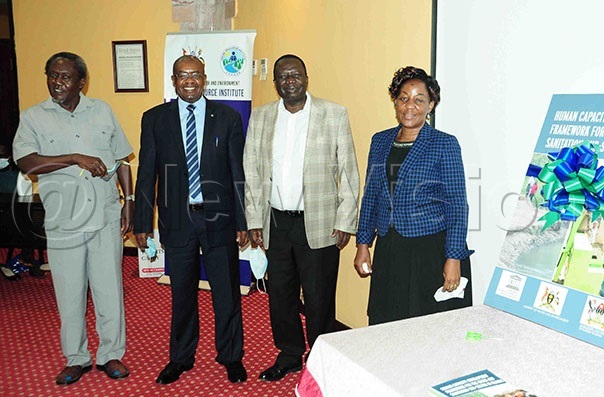Gov't, partners launch human capacity development tool
The Commissioner for Water Resources Planning and Regulation, Dr. Callist Tindimugaya said the ministry is to look at capacity building holistically in three areas.
GOVERNMENT|WATER
The Government has launched a tool to accelerate the delivery of quality services in the water and sanitation sub sector across the country.
The tool "Human capacity development framework for the water and sanitation" will equip water and sanitation professionals at various levels to address the challenges of water and sanitation countrywide.
The tool was designed by Makerere University of College of Agricultural and Environmental Sciences with support from the United Nations Educational, Scientific and Cultural Organization, with support from International Hydrological Programme.
The tool targets areas with water scarcity and increased population as a result of refugee settlement.
"The increasing demand for sector services arising from the high population growth, the impact of climate change and the current refugee crisis require investment in human capital development to meet the increasing demand for sector services," the Permanent Secretary of Ministry of Water and Environment, Alfred Okidi said.
The Human capacity development (HCD) tool provides the necessary guidelines and standards for delivery of learning and capacities for categories of programme human resources at all levels.
"The tool is striving to build capacity of junior, technicians and senior professionals in the water sector because these cadres are very instrumental in construction, operation and maintenance of water and sanitisation services right from the grassroots to national level," Okidi said.
He noted that the framework will further streamline the implementation and coordination of capacity development and also improve quality of human resources and service delivery in the water, sanitation management, and development sub programme in districts.
"It is going to help the ministry to respond to sector needs in a harmonised and coordinated approach while taking into account the existing enabling environment," Okidi added.

The Commissioner for Water Resources Planning and Regulation, Dr. Callist Tindimugaya said the ministry is to look at capacity building holistically in three areas namely; training of individuals to have the necessary skills, knowledge, and attitude to implement "our mandate and activities".
"To enhance capacity at organisational level where we should have the required systems and values to enable us delivering our sector mandate and improve capacity development in terms of having an enabling environment for us to handle reforms in the sub sector," he noted.
Tindimugaya said the sector had a number of challenges concerning human capacity development, stressing that the tool is going to address some of them.
He said the tool aims at improving the quality of human resources and service delivery in the water and sanitation sector.
Tindimugaya explained that with the existence of the water resources institute now, the ministry is now able to look around for resources to implement most of the programmes highlighted in the tool.
"Today, we have put out a campus that gives us direction about where we should be going in relation to capacity building that deals with water and sanitation," he added.
The Deputy Principal of College of Agricultural and Environmental Sciences of Makerere University Prof. Gorettie Nabanoga said water is a key resource of life, while the combination of two (water and sanitation) is crucial for our wellbeing,"
She said the road map is going to bring together all sectors to build the capacity needed to achieve the National Development Plan 111 and Vision 2040.
She further appreciated funders UNESCO and NEPAD for continuously injecting resources to help developing countries towards achieving the Sustainable Development Goals (SDGs).
"We as developing countries still need support to build capacity to take us where we want to be. Having this tool which is guiding our operations in the water and sanitation sub sector at all levels shows we shall succeed," Nabanoga said.
She said the tool is a human centered capacity development framework that puts the individual beneficiary in the middle of everything.